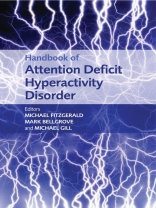Attention deficit hyperactivity disorder (ADHD) is one of the most
prevalent childhood psychiatric disorders of our time. The
condition is defined by levels of inattention, hyperactivity and
impulsivity that are in impairing and developmentally
inappropriate. Increasingly, there is a growing appreciation that
for many individuals the disorder may persist into adulthood and be
associated with significant social and economic burden.
Conditions, such as ADHD, that are manifestly heterogeneous in
terms of their clinical presentation, underlying neurobiology and
treatment response, must be tackled on multiple fronts. This
Handbook of Attention Deficit Hyperactivity Disorder provides a
state of the art position on each of these fronts from leading
clinicians and researchers from around the world. Broad in its
scope and comprehensive in its detail, this book should be as
useful to the student as it is to the experienced clinician or
researcher.
Spis treści
About the Editors
List of Contributors
Preface (Michael Fitzgerald, Mark A.
Bellgrove and Michael Gill).
Part I: CLINICAL PERSPECTIVES.
Chapter 1 The History of Attention Deficit Hyperactivity
Disorder (Louise Sharkey & Michael Fitzgerald).
Chapter 2 Diagnosis and Classification of ADHD in Childhood
(Louise Sharkey & Michael Fitzgerald).
Chapter 3 Diagnosis and Classification of ADHD in Adulthood
(Aiveen Kirley).
Chapter 4 ADHD and comorbid Oppositional Defiant and Conduct
Disorders (Paul Mc Ardle).
Chapter 5 ADHD, Autism Spectrum Disorders and Tourette’s
Syndrome: Investigating the evidence for Clinical and Genetic
Overlap (Louise Gallagher, Mark Bellgrove, Ziarih Hawi, Ricardo
Segurado & Michael Fitzgerald).
Chapter 6 Forensic Aspects of ADHD (Susan Young).
Part II: NEUROBIOLOGICAL PERSPECTIVES.
Chapter 7 Behaviour Genetic Approaches to the Study of ADHD
(Kellie S. Bennett, Florence Levy and David A.
Hay).
Chapter 8 Molecular Genetic Aspects of Attention Deficit
Hyperactivity Disorder (Ziarih Hawi & Naomi Lowe).
Chapter 9 Environmental Risk Factors and Gene-Environment
Interaction in Attention Deficit Hyperactivity Disorder (Edwina
Barry and Michael Gill).
Chapter 10 The Genetics of Adult ADHD (Frank A.
Middleton and Stephen V. Faraone).
Chapter 11 Functional Neuroimaging of Reward and Motivational
Pathways in ADHD (Clare Kelly, Anouk Scheres, Edmund S.J.
Sonuga-Barke, and F Xavier Castellanos).
Chapter 12 Genes, Cognition and Brain Activity: The
Endophenotype Approach to ADHD (Mark A. Bellgrove, Ian H.
Robertson and Michael Gill).
Chapter 13 The Psychopharmacology of ADHD (Mary V. Solanto,
Russell Schachar and Abel Ickowicz).
Chapter 14 Catecholamines and the Prefrontal Cortical Regulation
of Behaviour and Attention (Amy F.T. Arnsten).
Chapter 15 Stimulant Response in ADHD and Comorbid Anxiety
Disorder (Alasdair Vance).
Chapter 16 Avenues for Pharmacogenetic Research In ADHD
(Edwina Barry, Ziarih Hawi, and Aiveen Kirley).
Part III: TREATMENT PERSPECTIVES.
Chapter 17 Cognitive Behavioural Treatment of ADHD (Susan
Young).
Chapter 18 ADHD in the Classroom: Symptoms and Treatment
(Will Wilkinson and Malie Lagendijk).
Chapter 19 Psychosocial Treatments for Adults with ADHD (Sam
Goldstein and Robert Brooks).
Chapter 20 Avenues for the Neuro-Remediation of ADHD: Lessons
from Clinical Neurosciences (Redmond G. O’Connell, Mark A.
Bellgrove and Ian H. Robertson).
Part IV: CONCLUDING THOUGHTS.
Chapter 21 Evolutionary Aspects of ADHD (Ester
Klimkeit and John L. Bradshaw).
Chapter 22 Future Directions in ADHD Research and Clinical
Practice (Mark A. Bellgrove and Eric T. Taylor).
Index.
O autorze
Michael Fitzgerald is the Henry Marsh Professor of child and
Adolescent Psychiatry at Trinity College Dublin, Ireland and was
the first Professor of Child Psychiatry in Ireland. Michael has
held positions at the Bethlem Royal and Maudsley Hospital London
and the National Hospital for Nervous Diseases, Queens’s Square, as
well as King’s College Hospital, London. He received an MB from
University College Galway and an MD from Trinity College Dublin.
Michael has special interests in ADHD and autism and has over 300
published contributions to the literature including books,
peer-reviewed papers and letters to the editors. He has edited or
co-edited eight books.
Mark Bellgrove is a University of Queensland Principal
Research Fellow at the Queensland Brain Institute (QBI) and School
of Psychology at the University of Queensland, Brisbane, Australia.
Mark is an experimental psychologist by training and completed his
Ph.D. at Monash University, Australia. Mark undertook postdoctoral
training within the Departments of Psychology, Psychiatry and
Institute of Neuroscience at trinity College Dublin, Ireland,
working on endophenotypes for ADHD. Subsequently, Mark returned to
Australia as a National Health and Medical Research Council Howard
Florey Centenary Fellow, working at eh University of Melbourne.
Mark has a special interest in the cognitive neuroscience of
psychiatric disorders, including ADHD, autism and
schizophrenia.
Michael Gill is Professor and Head of the Discipline of
Psychiatry within the School of Medicine and Health Sciences at
Trinity College Dublin, Ireland. Michael leads the Neuropsychiatric
Genetics Research group which studies the molecular bases of a
number of psychiatric conditions including programmes in ADHD,
schizophrenia, and autism. Michael completed his MD at Dublin
University and is a Fellow of Trinity College Dublin. Michael is a
past Wellcome trust Research Fellow and Wellcome trust Senior
Research Fellow at the Institute of Psychiatry, London. Michael has
published over 200 peer-reviewed journal articles and his research
has attracted major funding from national and international funding
agencies.












